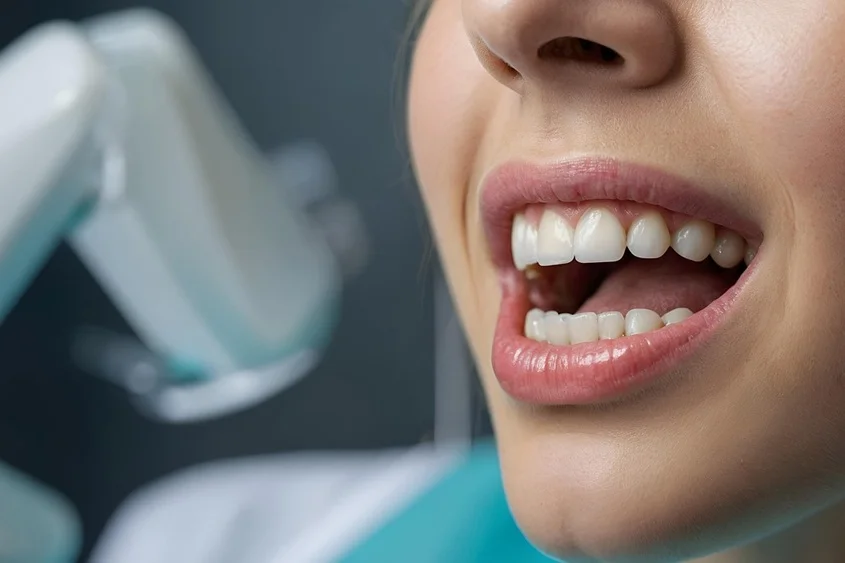Can Poor Oral Health Affect Your Mental Well-Being?
- Updated on: May 30, 2025
- 3 min Read
- Published on May 30, 2025

Are you wondering if there is any connection between your mental health and your oral health? Yes, they are connected in a way that eating healthy, regular exercise, and night sleep will result in better mental well-being among people. A healthy mouth leads to a healthy mind. Some research has shown that poor oral health tends to have poor mental health, as skipping dental care from their routine can result in tooth decay or even periodontal disease, which can potentially lead to chronic stress or poor sleep.
In this blog, we will learn how oral health is connected to mental health and what issues you can face, and solutions to those issues.
Connection between Mental Health and Oral Health
About 35% of younger respondents (i.e., aged 18–25 years) and 43% of females reported poor mental health . According to the Care Quest Study 2019, the adults who reported poor mental health were three times more likely to rate their oral health as poor, they were more likely to have one or more unmet oral health needs, and were suffering from financial and emotional hardship.
Another study from CareQuest found:
- Participants described their mental health as either fair or poor.
- Individuals struggling with poor mental health were more frequently prescribed opioids following dental or oral surgeries compared to those with better mental health.
- People with poor mental health were almost four times more likely to feel embarrassed or self-conscious about the condition of their teeth, mouth, or dentures than those with good mental health.
Bidirectional Relationship between Oral Health and Mental Health:
Your brain might raise a question: Does poor oral health cause poor mental health, or vice versa? The answer is that it works both ways, as there is also a bidirectional relation between them.
Poor Oral Health Causes Poor Mental Health:
- Dental pain, bad breath, or visible issues (like missing or stained teeth) can lower self-esteem and trigger social withdrawal.
- Embarrassment about oral appearance can cause anxiety or depression, especially in social or work situations.
- Ongoing dental issues may lead to chronic stress or poor sleep, which worsens mental health over time.
Poor Mental Health Causes Poor Oral Health:
- Depression and anxiety can reduce motivation to brush or floss regularly.
- Medications for mental illness often cause dry mouth, increasing the risk of cavities.
- Stress can lead to habits like teeth grinding, jaw clenching, or neglecting dental visits.
Dental Issues Caused by Poor Mental Health
Poor mental health can significantly impact your oral health, often without you even realizing it. People suffering from stress, anxiety, or depression may neglect regular dental hygiene or adopt habits that harm their teeth and gums. Here are some common dental problems linked to poor mental well-being:
- Tooth decay: Skipping brushing and flossing due to low motivation can lead to cavities.
- Gum disease (gingivitis or periodontitis): Poor oral hygiene and chronic stress weaken the immune response, increasing the risk of gum infections.
- Dry mouth (xerostomia): Many antidepressants and psychiatric medications reduce saliva production, creating a dry mouth environment prone to decay and infection.
- Teeth grinding (bruxism): Stress and anxiety often lead to unconscious teeth grinding, which wears down enamel and may cause jaw pain or cracked teeth.
- Mouth sores or ulcers: Emotional stress can contribute to the development of painful sores inside the mouth.
- Neglected dental care: Fear, fatigue, or lack of motivation may cause individuals to skip routine dental visits, allowing issues to worsen over time.
Maintaining both mental and oral health is essential. Recognizing these signs early can help you seek timely support from both dental and mental health professionals.
Simple Solutions to Support Better Oral Health
If your mental health has taken a toll on your smile, don’t worry. There are easy, accessible steps you can take to restore your smile. Start by reintroducing small daily habits like brushing twice a day and flossing regularly. If dental anxiety keeps you from visiting the clinic, consider at-home solutions. For example, using an impression kit can help you begin your clear aligner journey right from home, reducing the need for frequent in-office visits. If stains or discoloration from neglect have affected your confidence, a teeth whitening pen offers a quick and easy way to brighten your smile on the go.
Staying hydrated, managing stress, and setting reminders for oral hygiene can also make a big difference. And most importantly, don’t hesitate to seek support from a dental professional as they’re there to help, not judge.
Warp-Up
The link between oral health and mental health is stronger than many realize. Poor mental well-being can directly impact how individuals care for their teeth, leading to issues like decay, gum disease, and social discomfort. Fortunately, there are accessible ways to regain control. Simple steps, like using an impression kit to begin orthodontic care at home or a teeth whitening pen to boost self-confidence, can make a noticeable difference. Ultimately, taking care of your mouth isn’t just about your smile; it’s about supporting your mental health, too. Prioritize both, and you’ll feel the benefits inside and out.












